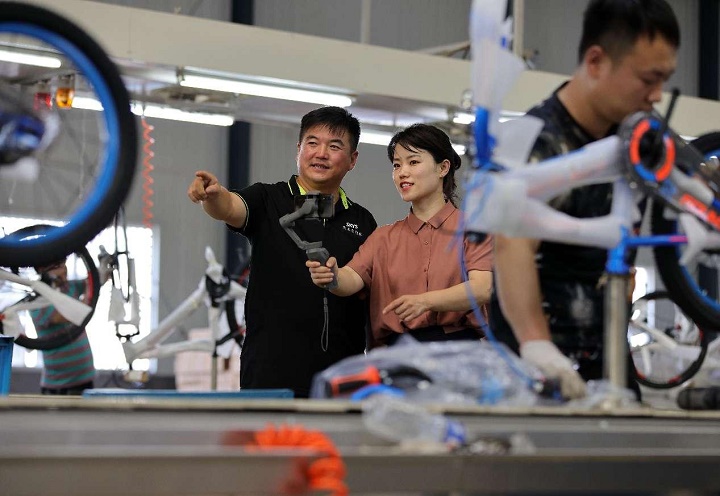
By Gong Wenjing
Online collaboration, which costs less and is more efficient than the traditional way of working, becomes a new trend in China with the progress of digitalization in various sectors.
China’s State Council recently issued a plan for the development of the digital economy during the country’s 14th Five-Year Plan period (2021-2025), which says that China will expand the coverage of collaboration systems and other online services.
As the construction of new infrastructure, including 5G network, big data centers, artificial intelligence (AI), and industrial Internet, picks up speed in China, companies’ basic hardware and software capabilities have significantly improved, which fuels the ecosystem of distance working, as insiders pointed out.
They believe that the steadily growing number of users and increase in companies’ individualized demands in the industry have encouraged remote work applications to open up their platforms to accommodate more vertical functions.
Thanks to Tencent Docs, an online document platform allowing for multi-person collaboration rolled out by Chinese tech giant Tencent, Ye Qing from the human resources department of a company finds herself more efficient at work. Before her company began to use the platform, she had to spend a lot of time on data collection, personal communication, and file transfer.
“Ever since I started to use DingTalk, it became so much easier to assign homework, communicate with parents, and live online classes,” said Qi Yitong, an elementary school teacher in Shenzhen, south China’s Guangdong province. Qi has made DingTalk, an intelligent working platform launched by Alibaba Group, an important part of his daily work.
The application of the intelligent working platform not only helps improve the work efficiency of teachers but creates a closer connection between students and teachers, according to Qi.

As of June 2021, the number of people working online in China had reached 381 million, which accounted for 37.7 percent of the total netizens in the country, said a report released by China Internet Network Information Center (CNNIC).
Remote collaboration is increasingly the norm in the workplace. By August 31, 2021, the number of users of DingTalk exceeded 500 million, and the number of various organizations using the platform, including enterprises and schools, surpassed 19 million.
China will advance the optimization and upgrading of remote collaboration products and services and promote the use of electronic contracts, seals, signatures, and authentication, according to the plan for the development of the digital economy during the country’s 14th Five-Year Plan period.
While more and more enterprises in the country embrace electronic licenses and seals, cities across China are making endeavors to launch high-efficient online services.
Shanghai issues the electronic license and seals simultaneously to a company when it is incorporated; Beijing makes sure that companies applying for authorization to conduct business in the city get the electronic license, invoice, and seal, and stipulates that electronic seal bears the same legal effect as a physical seal; and Wuhu city, east China’s Anhui province, allows companies to receive their electronic business licenses and five electronic seals via mobile phone after registration.
With the electronic license and seal, companies can have taxation, social security, and other services handled via online government affair platforms.
The approval process for the government and enterprises is often long, time-consuming, cumbersome, and consumes a lot of manpower and material resources, said Wang Peng, an associate research fellow at the management institute of Beijing Academy of Social Sciences.
The implementation of collaboration systems and relevant standards and policies helps optimize the operations of agriculture, manufacturing, financial services, and the services of government agencies, reduce procedural costs, and improve the overall operational efficiency of society, he added.










